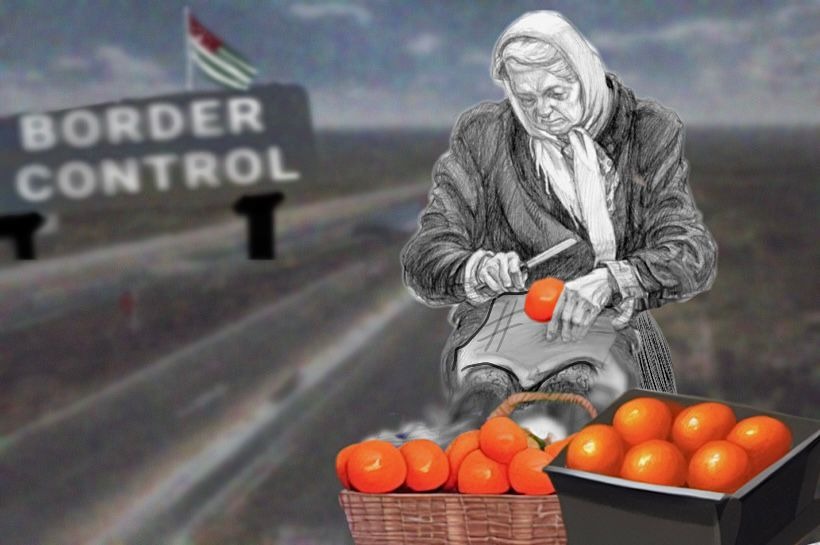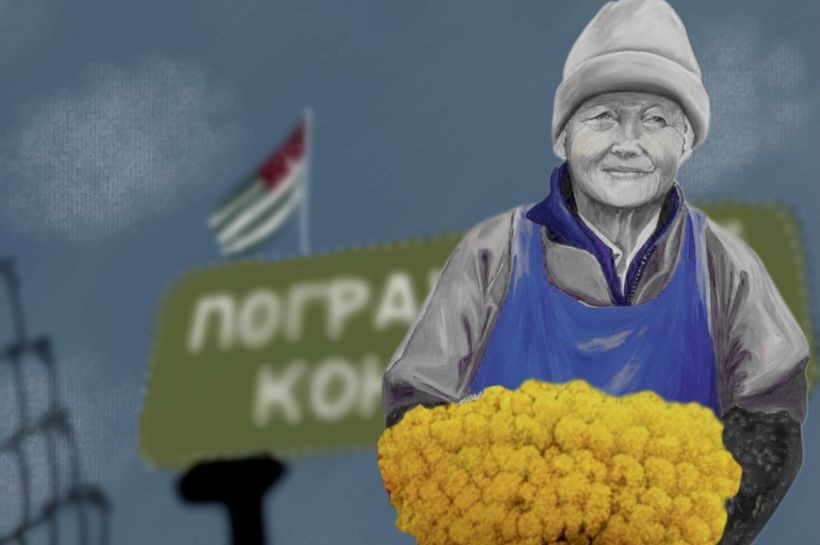Stories
30 Mar 2023
Role of women During the Blockade in Abkhazia
When there is a war underway, everyone prays for it to be over, hoping that everything will be the same as before. Unfortunately, the end of war does not always guarantee peace and a “happy ever after”.
As soon as the Georgian-Abkhaz war of 1992-1993 was over, Abkhazia was obstructed in a chain of severe economic and political blockades. The sanctions prevented any Abkhaz man from 16 to 65 years of age from legally crossing the Russian-Abkhazian border along the Psou river. The list of what could be taken in and out of blockaded Abkhazia could fit on a scrap of paper.
These are not the conditions under which the “happy ever after” one is praying for can develop. People naturally tend to adapt to their circumstances in spite of difficulty; this was the case in Abkhazia.
When the imposed sanctions on post-war Abkhazia restricted men’s capacity to support their families, women had to step into the role of breadwinners. This article shares the story of Alina, whose mother, alongside many other women in Abkhazia, assumed responsibility to provide for her family.

(c) Amina Adleiba
“After the war was over people in my village made money by selling what was growing around. Mainly they sold citrus, tangerines were especially in favor. Other in-demand produce included hazelnuts. Many Abkhaz families, even now, have huge hazelnut gardens in which they grow and harvest when the season comes. I remember how back then villagers would collect, clean, and sell them. Afterward, it would have been shipped to Turkey. Alongside agriculture, the product in demand was the first flower of spring – the mimosa. The bouquet of mimosa was a very popular gift for the celebration of the 8th of March and many Abkhaz women made money by selling it across the Psou border.
For my parents, the way to make money to support our family was by selling hazelnut. There were always hours of excruciating work behind every sack of hazelnut. First, the trees had to be shaken, then my siblings and I would collect them one by one. But the hardest part was when it came to the peeling. I remember our hands turning as rough as the peel of the hazelnut by the time we finished. Half of the sacks we prepared were stashed for winter, another half was put in a Zhiguli car and my parents would take it to the border. That is where the quest would begin. The border was packed with lines of people that had the same intention as my parents, to sell products across the border to make money. As men were not allowed to cross the border at all, it was women who were in charge of transferring the huge sacks of hazelnuts and tangerines. Some adapted by acquiring wheelbarrows. Two of the women from our neighborhood became the so-called professional wheelbarrowers. They did not have any land to grow agriculture, so their way of making money was to transfer other women`s products over the border lines for payment.
I remember how my mom once took me with her to the border. It was hazelnut season and we were selling. Being at the border was emotionally and physically exhausting. Hundreds of women pushing in line, arguing with each other. The conditions were worsened by border guards who offered advantages in exchange for bribes, asking for a share of what women transferred across the border.
That day it was raining and we had no umbrella. Both of us, my mom and I, were soaking wet while standing in a line full of people just like us. At that moment, out of hundreds of people, I saw a girl in a beautiful dress with her father. I knew and immediately recognized her, she was Abkhaz but lived in Saint-Petersburg, and she would spend her summer holidays in our neighborhood in Abkhazia. She approached as she saw us, opened an umbrella above my head, and said ‘Here, you can stand under it at least for a bit.’ I remember having mixed emotions at that moment. On the one hand, I was humbled by her careful action, but on the other, I felt ashamed that she saw me wet and grimy, in line trying to sell sacks of hazelnut. It was like two parallel lives met in a moment. None of us were to blame. All that made me wish to have a different life, far-far away from here and in different conditions.
Being part of post-war life and its conditions was quite shameful. Many women from our neighborhood were ashamed to go to trade on the Psou river. They all were educated people, with professions, but they could not make a profit from these. They were teachers, accountants, and doctors, but salaries were very small, some would receive a loaf of bread instead of money. They had no other choice. Trading, whether they liked it or not, was their only solution.
Now it is personally hard for them to remember those days. I guess they’re still ashamed, but I think they are real-life heroes. Notwithstanding all the hardship of post-war life and blockade, they managed to feed and provide their families with necessities. Being a breadwinner for a family is hard, but what won’t you do for the ones you love?

(c) Amina Adleiba
I remember how my mom and our closest relative once decided to travel to Moscow by train and sell mimosa. It was spring, the 8th of March was close and they could make good money out of selling it. They would collect it everywhere it was growing.
Selling flowers, especially a mimosa, is not as easy as it seems. Mimosa is quite a capricious thing. It was hard to transport and required special conditions so it would not lose its product shape. To get it to the selling point in a good shape and condition, women would wrap it in newspapers. That is what my mom and our relative did. In a Russian frost in Moscow, they sold mimosas for a whole day. They came back all frozen and sick. I remember their recovery took two weeks, but for them, it did not matter, because they managed to sell mimosa in a good shape and for good money, which was enough to provide for their families until the hazelnut season.”
The years of blockade changed the shape of society in Abkhazia, many women did not go back to their pre-war lives. For a period men stepped out of their roles as family breadwinners and the void was filled by strong and hardworking women. Some of them managed to turn their way of surviving into business. That had its own impact on society in general. Being victims of circumstances and going through the hardship of post-war conditions increased the role of women in Abkhazia.
Leave a Comment